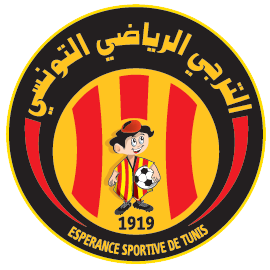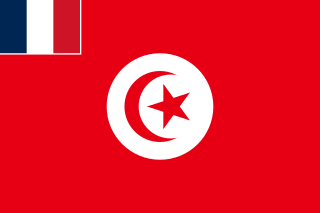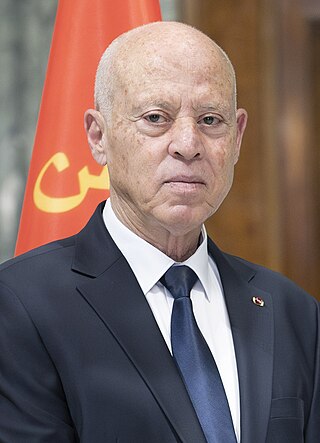
Tunisia, officially the Republic of Tunisia, is the northernmost country in Africa. It is a part of the Maghreb region of North Africa, bordered by Algeria to the west and southwest, Libya to the southeast, and the Mediterranean Sea to the north and east. Tunisia also shares maritime borders with Italy through the islands of Sicily and Sardinia to the north and Malta to the east. It features the archaeological sites of Carthage dating back to the 9th century BC, as well as the Great Mosque of Kairouan. Known for its ancient architecture, souks, and blue coasts, it covers 163,610 km2 (63,170 sq mi), and has a population of 12.1 million. It contains the eastern end of the Atlas Mountains and the northern reaches of the Sahara desert; much of its remaining territory is arable land. Its 1,300 km (810 mi) of coastline includes the African conjunction of the western and eastern parts of the Mediterranean Basin. Tunisia is home to Africa's northernmost point, Cape Angela. Located on the northeastern coast, Tunis is the capital and largest city of the country, which is itself named after Tunis. The official language of Tunisia is Modern Standard Arabic. The vast majority of Tunisia's population is Arab and Muslim. Vernacular Tunisian Arabic is the most spoken, and French also serves as an administrative and educational language in some contexts, but it has no official status.

Tunis is the capital and largest city of Tunisia. The greater metropolitan area of Tunis, often referred to as "Grand Tunis", has about 2,700,000 inhabitants. As of 2020, it is the third-largest city in the Maghreb region and the eleventh-largest in the Arab world.

The Maghreb, also known as the Arab Maghreb and Northwest Africa, is the western part of the Arab world. The region comprises western and central North Africa, including Algeria, Libya, Mauritania, Morocco, and Tunisia. The Maghreb also includes the disputed territory of Western Sahara. As of 2018, the region had a population of over 100 million people.

Zine El Abidine Ben Ali, commonly known as Ben Ali or Ezzine, was a Tunisian politician who served as the second president of Tunisia from 1987 to 2011. In that year, during the Tunisian revolution, he was overthrown and fled to Saudi Arabia.

The president of Tunisia, officially the president of the Republic of Tunisia, is the head of state since the creation of the position on 25 July 1957. In this capacity, he exercises executive power with the assistance of a government headed by the Prime Minister in a presidential system. According to Article 87 of the 2022 Constitution, he is the commander-in-chief of the Tunisian Armed Forces. Under the Constitution, the president is elected by direct universal suffrage for a term of five years, renewable once.

The Tunisia national football team represents Tunisia in men's international association football. The team is a member of both FIFA and CAF, the Confederation of African Football. It is governed by the Tunisian Football Federation, founded in 1957. Colloquially known as the Eagles of Carthage, the team's colours are red and white, and the bald eagle is its symbol. Most of Tunisia's home matches are played at the Hammadi Agrebi Stadium in Radès since 2001.
The Mali national football team represents Mali in men's international football and is governed by the Malian Football Federation. The team's nickname is Les Aigles. They represent the country at tournaments organized by both FIFA and the Confederation of African Football (CAF).

Tunisian Arabic, or simply Tunisian, is a variety of Arabic spoken in Tunisia. It is known among its 12 million speakers as Tūnsi, "Tunisian" or Derja to distinguish it from Modern Standard Arabic, the official language of Tunisia. Tunisian Arabic is mostly similar to eastern Algerian Arabic and western Libyan Arabic.

The Tunisian Football Federation is the governing body of football in Tunisia. It established on 29 March 1957. It became a member in the FIFA in 1960, and in the same year it also became a member of CAF association. The federation also joined the UAFA in 1976 and the UNAF in 2005.

The history of the Jews in Tunisia extends nearly two thousand years to the Punic era. The Jewish community in Tunisia is no doubt older and grew up following successive waves of immigration and proselytism before its development was hampered by anti-Jewish measures in the Byzantine Empire. The community formerly used its own dialect of Arabic. After the Muslim conquest of Tunisia, Tunisian Judaism went through periods of relative freedom or even cultural apogee to times of more marked discrimination. The arrival of Jews expelled from the Iberian peninsula, often through Livorno, greatly altered the country. Its economic, social and cultural situation has improved markedly with the advent of the French protectorate before being compromised during the Second World War, with the occupation of the country by the Axis. The Israeli Declaration of Independence in 1948 and following 1948 Arab–Israeli War provoked a widespread anti-Zionist reaction in the Arab world, to which was added nationalist agitation, nationalization of enterprises, Arabization of education and part of the administration. Jews left Tunisia en masse from the 1950s onwards because of the problems raised and the hostile climate created by the Bizerte crisis in 1961 and the Six-Day War in 1967. According to the Jewish Virtual Library, the Jewish population of Tunisia, was estimated at 105,000 individuals in 1948. These Jews lived mainly in Tunis, with communities present in Djerba. The 2022 Report on International Religious Freedom by the U.S Department of State stated that "according to members of the Jewish community, there are approximately 1,500 Jewish citizens in the country".

Espérance Sportive de Tunis, known as ES Tunis or simply EST for short, and nicknamed “Mkashkha”, The Elder of Tunisian Clubs, The Blood and Gold Club and The Beast of Africa is a Tunisian professional sports club. It was founded on 15 January 1919 in the Bab Souika neighborhood in Tunis. Its best known football section has been active in the first Tunisian Professional League 1 since 1936, during which it played 63 seasons, except for the 1970–71 season.

The Etoile Sportive du Sahel, known as Etoile SS or simply ESS for short, is a Tunisian football club based in Sousse in the Sahel region of Tunisia. Their home stadium, Sousse Olympic Stadium, has a capacity of 40,000 spectators. The club is currently playing in the Tunisian Ligue Professionnelle 1, the Tunisian top-flight football league.

Club Sportif Sfaxien, known as CS Sfaxien or simply CSS for short, is a Tunisian football club based in Sfax. The club was founded in 1928 and its colours are black and white (Bianconero). Their home stadium, Taieb Mhiri Stadium, has a capacity of 12,000 spectators. The club is currently playing in the Tunisian Ligue Professionnelle 1.
The Tunisian Professional League 1, previously called the Tunisian National Championship between 1956 and 1994, is the top division football tournament in Tunisia under the organization of the Tunisian Football Federation. The first edition was held during the French protectorate of Tunisia, the 1907 season, under the auspices of the Federation of Union des Sociétés Françaises de Sports Athlétiques, and it was played in a knockout system, and the first official match was played on 9 June 1907.

Tunisian cuisine, the cuisine of Tunisia, consists of the cooking traditions, ingredients, recipes and techniques developed in Tunisia since antiquity. It is mainly a blend of Mediterranean and native Punic-Berber cuisine. Historically, Tunisian cuisine witnessed influence and exchanges with many cultures and nations like Italians, Andalusians, French and Arabs.

Harissa is a hot chili pepper paste, native to the Maghreb. The main ingredients are roasted red peppers, Baklouti peppers (بقلوطي), spices and herbs such as garlic paste, caraway seeds, coriander seeds, cumin and olive oil to carry the oil-soluble flavors.

The French protectorate of Tunisia, officially the Regency of Tunis and commonly referred to as simply French Tunisia, was established in 1881, during the French colonial empire era, and lasted until Tunisian independence in 1956.

The Tunisian revolution, also called the Jasmine Revolution and Tunisian Revolution of Dignity, was an intensive 28-day campaign of civil resistance. It included a series of street demonstrations which took place in Tunisia, and led to the ousting of longtime dictator Zine El Abidine Ben Ali in January 2011. It eventually led to a thorough democratization of the country and to free and democratic elections, which had led to people believing it was the only successful movement in the Arab Spring.

On 26 June 2015, a mass shooting occurred at the tourist resort at Port El Kantaoui, about 10 kilometres north of the city of Sousse, Tunisia. Thirty-eight people, 30 of whom were British, were killed when a gunman, Seifeddine Rezgui, attacked a hotel. It was the deadliest non-state attack in the history of modern Tunisia, with more fatalities than the 22 killed in the Bardo National Museum attack three months before. The attack received widespread condemnation around the world. The Tunisian government later "acknowledged fault" for slow police response to the attack.

Kais Saied is a Tunisian politician, jurist and retired professor of law currently serving as the seventh president of Tunisia since October 2019. He was president of the Tunisian Association of Constitutional Law from 1995 to 2019.


















